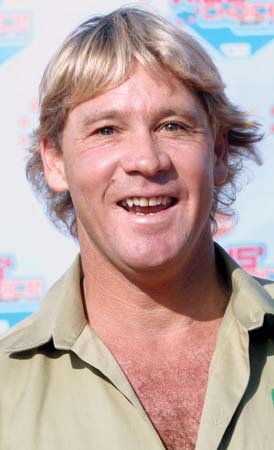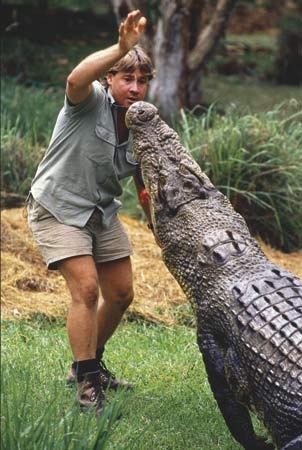Irwin, Steve
Australian wildlife conservationist and television personality
in full Stephen Robert Irwin
born Feb. 22, 1962, Essendon, Vic., Austl.
died Sept. 4, 2006, off the coast of Port Douglas, Queens.
 wildlife conservationist, television personality, and educator, who achieved worldwide fame as the exuberant host of The Crocodile Hunter (1992–2006) television series and related documentaries. With frenetic energy and an engaging boyish enthusiasm, Irwin led his viewers on recklessly close encounters with deadly and usually endangered animals, notably crocodiles, in Australia's Outback and later in the jungles of Asia and Africa. Although sometimes criticized for disturbing wildlife unnecessarily or for indulging in showmanship, Irwin claimed that his risk-taking style helped to raise concern for threatened but dangerous animals and enabled viewers to appreciate directly their power, beauty, and uniqueness.
wildlife conservationist, television personality, and educator, who achieved worldwide fame as the exuberant host of The Crocodile Hunter (1992–2006) television series and related documentaries. With frenetic energy and an engaging boyish enthusiasm, Irwin led his viewers on recklessly close encounters with deadly and usually endangered animals, notably crocodiles, in Australia's Outback and later in the jungles of Asia and Africa. Although sometimes criticized for disturbing wildlife unnecessarily or for indulging in showmanship, Irwin claimed that his risk-taking style helped to raise concern for threatened but dangerous animals and enabled viewers to appreciate directly their power, beauty, and uniqueness.Irwin derived his passion for wildlife from his parents, who participated in early efforts to protect Australia's wild reptiles. In 1970 the family moved from Victoria to Queensland's Sunshine Coast, where Bob and Lyn Irwin founded the Beerwah Reptile Park on 4 acres (1.6 hectare) of land. The young Irwin accompanied his father on expeditions in the Outback to trap lizards, poisonous snakes, and crocodiles, and he helped to nurse and rehabilitate the injured or abandoned kangaroos, wallabies, and birds that the park took in.
In the early 1970s Irwin accompanied his father on expeditions for the East Coast Crocodile Management Program, a government-sponsored project to reduce crocodile hunting by relocating the animals to less-populated areas or to sanctuaries, including the Beerwah park. It was on one such outing, when Irwin was age nine, that he first attempted to subdue a crocodile by jumping on its back. He soon became quite adept at the technique.
In the early 1980s Irwin worked for the Crocodile Management Program on his own, sometimes spending months alone in the bush in search of the animals. Skilled at capturing the largest and most dangerous crocodiles, he eventually acquired a reputation as Australia's top “croc catcher.”
Irwin recorded some of his exploits on tape using a video camera mounted on a tripod. Hired as a consultant for a television commercial, he showed some of the tapes to a producer at Australia's Channel 10 network, who immediately suggested turning them into a documentary. The result was a 10-hour program, The Crocodile Hunter, which first aired in Australia in 1992. Its immediate success led to additional documentaries and eventually to a regular series, which featured Irwin in new adventures both inside and outside Australia. In 1996 the program was picked up by the Discovery Channel network in the United States. In 2006, the year of Irwin's death, it was regularly broadcast in more than 100 countries.
 In 1991 Irwin took over direction of the Beerwah park from his father. During one of his “croc feeding” demonstrations at the park, he met Terri Raines, an American businesswoman and conservationist; the couple married in 1992. Terri Irwin soon became the manager of her husband's business and conservation projects, also participating directly in the filming of The Crocodile Hunter and later documentaries and series.
In 1991 Irwin took over direction of the Beerwah park from his father. During one of his “croc feeding” demonstrations at the park, he met Terri Raines, an American businesswoman and conservationist; the couple married in 1992. Terri Irwin soon became the manager of her husband's business and conservation projects, also participating directly in the filming of The Crocodile Hunter and later documentaries and series.Meanwhile, Irwin's popularity as a television personality helped to turn the Beerwah park, renamed the Australia Zoo in 1992, into a major tourist attraction; it expanded to 16 acres (6.5 hectares) and 550 animals by 2000 and to 80 acres (32 hectares) and more than 1,000 animals by 2007. In addition to running the zoo, the Irwins established large private wildlife refuges in Australia and founded an international organization, Wildlife Warriors Worldwide, to promote wildlife conservation, education, and research.
In his television series and in numerous interviews, Irwin emphasized the importance of protecting threatened and endangered species of all kinds. Asked about the infectious excitement of his Crocodile Hunter adventures, he said,
I believe that education is all about being excited about something.…That's the main aim in our entire lives is to promote education about wildlife and wilderness areas, save habitats, save endangered species, etc. So, if we can get people excited about animals, then by crikey, it makes it a heck of a lot easier to save them.
In September 2006, while filming a documentary called The Ocean's Deadliest near Australia's Great Barrier Reef, Irwin swam over a venomous bull stingray (ray) in shallow water, inadvertently provoking the animal to attack. He was stung in the chest and immediately went into cardiac arrest, and he was pronounced dead less than an hour later.
- mona monkey
- monarch
- monarch butterfly
- Monarchianism
- monarchy
- Monarda
- Monashee Mountains
- Monash, Sir John
- monastery
- monasticism
- Monastir
- monatomic gas
- Mona Van Duyn
- monazite
- Monboddo, James Burnett, Lord
- Moncalieri
- Monchegorsk
- Monchique Mountains
- Monck, George, 1st duke of Albemarle, earl of Torrington, Baron Monck of Potheridge, Beauchamp and Teyes
- Monck, Sir Charles Stanley, 4th Viscount
- Monclova
- Moncton
- Moncure Daniel Conway
- Mondale, Walter
- Monday